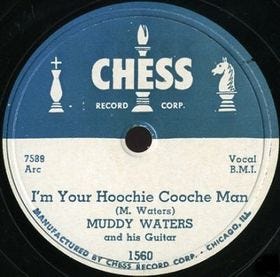Hoochie Coochie Man
Muddy Waters (1954). Excerpt from "The 50 Songs that Gave Birth to Rock and Roll"
The end of World War II saw a massive migration, as black laborers from the South journeyed northward in search of better-paying work. It was thus that over the following decade, the heart of blues country moved from the Mississippi Delta to the mean streets of downtown Chicago.
The rustic mystique of pre-war blues was replaced by something harder, nastier, more in-your-face. Muddy Waters is the most important link between these two traditions. As the blues moved north, so did the man who was born McKinley Morganfield in Issaquena County, Mississippi.
As Muddy Waters, he would become one of the preeminent popular musicians of the 20th century. His deep resonating voice, his commanding physical presence, and his muscular accompaniment would make Waters’s catalogue of work instrumental, not just in bridging the gap between South and North, between Mississippi and Chicago, between acoustic and electric, but ultimately in beginning the process of making blues indistinguishable from rock and roll. Like a few other artists on this list, pinning Muddy’s importance in rock and roll to one song is difficult, to say the least.
Though Muddy had already picked up the electric guitar a few years prior, his performance on the Willie Dixon-penned vehicle would mark his first with a full band behind him. “Hoochie Coochie Man”—with its burly braggadocio, hoodoo theme, and heavy electrification—is the defining song of the Chicago blues genre. It would also become the biggest hit yet for Muddy Waters, reaching #3 on Billboard’s R&B chart and remaining in play for 13 weeks.
It could be argued that of all Muddy Waters’s recordings, this remains the most iconic and perhaps the most frequently covered. Again, this is saying a lot, considering that this guy pretty much inspired every single blues rock artist of the mid and late 60s, on either side of the Atlantic. But couched in the stop-time rhythm of “Hoochie Coochie Man” is also an immediate predecessor to the famous Bo Diddley beat that would thereafter launch a billion hits.
Waters would of course continue on to monumental success, perhaps unmatched in the blues milieu by anybody but B.B. King, before succumbing to heart failure in 83 at age 70. He would leave a massive legacy behind him.
See the full list of 50 Songs that Gave Birth to Rock and Roll





On this song and others, Muddy regularly declared he was a "man". And he was right: when it came to the blues, he was THE man.